The Best Cat Food for Bengals 2025
Quick Guide
Bengals are a medium-large domestic cat breed that dates back to the 1980s. They were developed by crossing domestic breeds with the small, shy Asian Leopard Cat. By now this cross is many generations removed for most breeders and Bengals are bred from Bengal x Bengal litters.
Bengals are raised and cared for the same as other domestic cats. While they are easy to recognize because of their exotic markings that resemble leopards, jaguars, and ocelots, they are not an exotic or “wild” cat.
They are playful, intelligent, curious, charming pets that get along well with other cats and dogs in the home. They make a good pet for people who enjoy an active, inquisitive cat.
Feeding your bengal healthy food will keep them an active member of your family. We have chosen some of the best options below to help you narrow your search.
What is the Best Cat Food for a Bengal?
- Earthborn Holistic Primitive Feline
- Instinct Grain Free Ultimate Protein Kibble For Cats Chicken Formula
- Smalls for Smalls Fresh Chicken Pate
- Wellness Complete Health (canned) Turkey & Salmon Recipe
- Tiki Cat Puka Puka Luau
- Orijen Cat & Kitten Grain-Free Dry Food
- Wellness Complete Health Kitten Recipe
- Fromm Mature Gold
- Precise Naturals Senior Formula
- Nature’s Variety Instinct Limited Ingredient Turkey Formula
- L.I.D. Limited Ingredient Diets® Duck & Green Pea Canned Cat Formula
Diet & Nutrition
We realize that many cat lovers like the idea of feeding a raw food diet. However, this kind of diet is not easy for everyone to follow. Most people feed their cats commercial cat food. Yet, even if you feed your Bengal a commercial diet, you can make sure that you feed a good quality food.
As with other cats, we recommend that you choose food for your Bengal that is AAFCO- (Association of American Feed Control Officials) approved. AAFCO is a voluntary membership association of local, state and federal agencies charged by law to regulate the sale and distribution of animal feeds and animal drug remedies. While AAFCO is not perfect, at least it provides some minimum standards for pet foods and labeling.
Here are some things you should look for in a good cat food:
- Named meats
- Avoid artificial colors, flavors, and preservatives
- Low carbs
Meat protein is very important for all cats. For this reason we do not automatically discount some cat foods that use meat by-products, especially if they are low in carbohydrates. This is different from the way dog foods are usually evaluated. With dog foods, meat by-products are often considered a lower quality ingredient. However, as obligate carnivores, cats have such a need for meat protein that many experts are willing to overlook this fact in order for cats to get the meat protein they need in their diet. You should also look for foods that have added taurine and added Vitamin A since cats need these nutrients in their diets and cannot make them in sufficient quantities in their own bodies.
Many cat owners today prefer wet (canned or similar) foods over dry foods. Cats often have urinary tract diseases which are worsened by dry foods and not drinking enough water. Wet/canned foods provide much more moisture in the cat’s diet. However, there are some situations where you might prefer to feed a dry cat food or it fits better with your lifestyle. In these situations, make sure that you are providing your cat with plenty of fresh water. It’s often a good idea to provide an automatic waterer, especially the fountain type, since the running water seems to encourage cats to drink more.
Common Health Problems Related To Food
Bengals do have a few health issues such as hypertrophic cardiomyopathy, progressive retinal atrophy (PRA), cataracts, luxating patellas, and a sensitivity to anesthetics, but none of these issues is particularly food-related.
Like other cats, Bengals can gain extra weight, especially as they age. They are athletic cats so they are unlikely to be overweight when they are young but you should watch their weight and calories as they get older. Most cats today live indoors and many are spayed/neutered, which increases their risks of becoming obese since the absence of certain hormones can slow their metabolism. Obesity is one of the health problems most frequently seen in cats today. Many middle-aged cats (often between 5-10 years of age) gain weight, have excess body fat, and get very little exercise. Cats simply eat more food than they can use up with their energy requirements. This can be caused by overfeeding, by leaving down food for free feeding at all times, by feeding high-calorie foods, and by giving high-calorie treats, along with lack of exercise.
There can be other causes of obesity but in most cases cats become obese because they are eating more calories than they can use. If your Bengal is overweight or obese, he should be encouraged to lose weight. A weight loss diet for cats typically relies on higher protein and fiber with lower fat. You can also encourage your cat to get more exercise.
Obesity can lead to serious health problems for cats so this condition should be addressed. It can reduce your cat’s lifespan, affect his bones and joints, digestive organs, and his ability to breathe properly.
Obesity in cats can also lead to diabetes mellitus. Symptoms of this form of diabetes include: constant hunger, weight loss, increased urination, and increased consumption of water. It can affect any cat but it is most common in older, obese cats. Male cats are more susceptible than females. Left untreated, this disease will shorten your Bengal’s lifespan. It can be treated in several ways, depending on the severity of the condition, but there is no cure. Getting your cat’s weight under control usually helps a great deal.
Carrying extra weight can also worsen a Bengal’s chances of having a problem with luxating patellas.
Cats can also develop urine crystals and bladder stones which appear to be related to their diet in some cases. In male cats crystals may plug the urethra, which can become a life-threatening condition because it prevents the cat from urinating. In other cats, stones develop somewhere along the urinary tract (kidneys, bladder, urethra, etc.). Stones can also cause an obstruction and prevent the cat from urinating. Some cats may strain and pass blood when trying to urinate. The crystals and stones are formed by minerals in the cat’s urine. The cat’s diet is believed to play a role in the development of the crystals and stones since they are more likely to develop in urine that is alkaline.
If you suspect your Bengal is at risk of forming crystals or stones, there are special diets available so you can change the pH of the food you are feeding. One thing that all cat owners can do to help prevent the formation of crystals and stones is to make sure their cat is drinking plenty of water. Drinking more water keeps urine less concentrated. It encourages your cat to pee more often so the urine will stay in the urinary tract for shorter periods of time, meaning there is less chance of crystals collecting.
Feeding
Bengal Eating Habits
Despite the fact that the Bengal was developed from crosses to the non-domestic Asian Leopard Cat in the 1980s, today the Bengal requires the same kind of diet as other domestic cats. They eat the same food as other cats. You don’t have to go out and kill a water buffalo to feed your Bengal. As with other cats, some Bengals have a hearty appetite and some can be finicky. Choose good quality, healthy food that appeals to your cat. Some people prefer one of the raw diets while others like to feed wet/canned food. There are good dry cat foods but many cat experts today recommend wet/canned foods instead of dry because of the urinary tract problems cats can have which are often linked to not having enough moisture in their diet.
Make sure you always have fresh, clean water available for your Bengal.
You can typically feed a Bengal kitten that is three-months-old three small meals per day. This can be reduced to two meals per day by the time the kitten is six months of age but you should be increasing the amount of food. Remove any food that is not eaten after about 10 minutes. This is particularly true with wet/canned food. Any food left sitting in the floor will soon go rancid. Overfeeding and free feeding, in general, can lead to obesity in cats.
Best Cat Food For Bengals
Like other cats, Bengals will thrive on good food. They don’t usually have any particular health-related problems that should affect their diet. However, it’s always important to watch your cat’s weight and condition. If your cat begins to gain weight (or lose weight), that can be a sign of a change in his health and he should see a veterinarian. Becoming overweight or obese can lead to serious health problems for your Bengal so you might need to change his food or cut back on his portions. While many Bengals live very long lives, it’s always a good idea to check with your veterinarian if you have any concerns about changes in your cat’s eating habits, weight, physical condition, or behavior.
We do recommend paying attention to the calories in foods. If your Bengal is having digestive problems, for example, you may be feeding him too much food. Check the calories and adjust his portion to the amount he actually needs. You can sometimes find calorie information on the can or bag. If not, check the web site for the brand. It is usually listed. AAFCO guidelines now recommend that pet food companies begin including calorie information for pets but not every company has complied.
Best Food For Adult Bengals
Research shows that adult cats need a minimum of 26 percent protein in their diet (dry matter basis). Many good quality cat foods will have a much higher percentage of protein. In the wild or living as a feral, a cat would eat 50-60 percent protein in their diet and around 25 percent fat, from catching live food. We have suggested some foods for adult Bengals that approach these figures. We think these foods are suitable for active young adult Bengals.
| Food | Price | Nutrition | Rating |
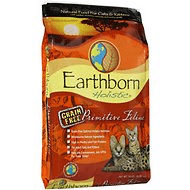 Earthborn Holistic Primitive Feline (Dry) Earthborn Holistic Primitive Feline (Dry)Read Reviews |
$2.29/lb |  |
 |
 Instinct Grain Free Ultimate Protein Kibble For Cats Chicken Formula Instinct Grain Free Ultimate Protein Kibble For Cats Chicken FormulaRead Reviews |
$4.50/lb |  |
 |
 Smalls for Smalls Fresh Chicken Pate Smalls for Smalls Fresh Chicken PateRead Reviews |
Varies |  |
 |
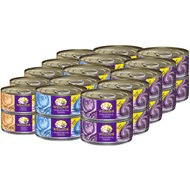 Wellness Complete Health (canned) Turkey & Salmon Recipe Wellness Complete Health (canned) Turkey & Salmon RecipeRead Reviews |
$1.70/5.5 oz can |  |
 |
 Tiki Cat Puka Puka Luau Tiki Cat Puka Puka LuauRead Reviews |
$1.52/2.8 oz can |  |
 |
Best Dry Foods for Bengals
If you are looking for good dry foods, there are some that we like. Again, it is especially important to make sure that your cat is drinking plenty of water if you are feeding a dry cat food.
Earthborn Holistic Primitive Feline
Recommended by people familiar with Bengals, Earthborn Holistic Primitive Feline is high in protein, grain and gluten-free. It has good sources of meat protein that Bengals should enjoy and it’s low in carbs. It also has the added nutrients and supplements that Bengals (and other cats) need to stay healthy. This is an all life stage formula so you can feed it to kittens and adult cats.
Instinct Grain Free Ultimate Protein Kibble For Cats Chicken Formula
Instinct Grain Free Ultimate Protein Kibble for Cats Chicken Formula uses only real chicken – no rendered meats, chicken meal, or by-product meal. It’s high in protein and slightly lower in fat than some other dry cat foods. We think it’s a good choice for Bengals that love their meat protein but might need to be a little more careful about calories. Otherwise, this food has everything your cat could want to stay healthy. And the food should appeal to your cat. The kibble pieces have a freeze dried raw coating for better taste.
Best Wet Foods for Bengals
Smalls for Smalls Fresh Chicken Pate
Smalls for Smalls Fresh Chicken Pate is a fresh cat food carefully formulated for your cat based on a profile you create when you sign up. Smalls for Smalls recipes have high protein content because cats are primarily carnivores and get most of their nutrition from meat. They also have high water content, because cats rely on their food to help them stay hydrated. Smalls for Smalls is a cat food you can trust — they say that if the ingredients wouldn’t be good enough for humans to eat, then they don’t deem it good enough for your cat, either. All their recipes are gently cooked so the nutrition is locked in, and the benefits are numerous.
Wellness Complete Health (canned) Turkey & Salmon Recipe
Wellness is another brand that is recommended by people who know Bengals. We like this food for Bengals because it has lots of meat protein and it’s low in carbs. We think this food comes close to the kind of protein and fat percentages your cat would eat if he were catching his own food. It should satisfy his craving for meat and it’s a healthy food. Wellness has lots of recipes so you can rotate and find flavors that your Bengal likes.
Tiki Cat is another food that is often highly recommended for adult cats. We think that Bengals can benefit from eating this food. This food contains very natural ingredients with added vitamins and minerals. It’s high in moisture, protein, and fat, like food that your Bengal would catch as prey. Tiki Cat’s foods mimic live prey to a great extent and are biologically appropriate for cats. Highly recommended for Bengals.
Best Kitten Food For Bengals
Food for kittens should have an AAFCO nutritional adequacy statement that says the food is appropriate for growth/reproduction. All life stage foods can also be fed to kittens since these foods have been approved for cats at all stages of growth and for adult cats. Kittens have different nutritional needs than adult cats on a maintenance diet. For example, kittens need a minimum of 30 percent protein for growth, while adult cats need a minimum of 26 percent. Kittens need more calcium while they are growing, and so on. So, look for foods that are especially made for kittens or for all life stage foods.
Dry Food
Orijen Cat & Kitten Grain-Free Dry Food
If you prefer a dry food for your kitten, we suggest the bestselling Orijen Cat & Kitten Grain-Free Dry Cat Food. Like other Orijen foods, Orijen Cat & Kitten is biologically appropriate. Some 90 percent of the ingredients are poultry, fish, and eggs, with just 10 percent from vegetables, fruits, and botanicals. The food contains whole prey ratios of meat, organs, cartilage, and other ingredients so it is more natural and like eating nutrients from live prey for your Bengal kitten. Kittens should also find the food tasty since it has infusions of freeze dried liver.
Wet Food
Wellness Complete Health Kitten Recipe
We think Bengal kittens will do well on Wellness Complete Health Kitten Recipe. This food has plenty of protein, fat, and calories to provide the energy your kitten needs to grow. Healthy ingredients support healthy growth. We think your Bengal kitten will grow strong muscles and bones eating this food.
Best Cat Food For Senior Bengals
Senior cats tend to be different from senior dogs. Most mature cats have decreasing energy needs until they are about 11 years of age. At that time their energy requirements start increasing again as they grow older. Middle-aged cats often have problems with obesity but as they age, cats can begin to lose weight. These elderly cats may not digest or absorb protein and fat as well as younger cats. They often need food that is easy to digest so they can get the energy they need. As your cat gets older, it’s important to monitor his weight and condition so you can adjust his diet. There is no need to restrict the amount of protein your older cat eats unless he has a specific health issue and your veterinarian recommends a change in his diet.
Bearing in mind the fact that Bengals often live to be 15 years of age, these are important considerations for this breed.
Dry Food
High in protein and moderate in fat, Fromm still has enough calories to keep your older Bengal happy. This food has the same good ingredients that Fromm foods normally have but they manage to make this food with a little less fat. We think this food is good for less active older Bengals and those who might need to lose a little weight. Fromm also has an adult Gold formula and one for kittens.
Wet Food
Precise Naturals Senior Formula
Another food we recommend for older cats is Precise Naturals® Senior Formula, especially if you prefer a canned food. This food has ingredients that your Bengal should find tasty and easy-to-digest. It has high protein and fat and plenty of moisture in this canned form. Plus, Precise is known for making specialized diets. We think senior Bengals can benefit from eating this senior formula.
Best Cat Food For Bengals With Food Allergies/Intolerances
Any animal may have a food allergy or intolerance, regardless of breed. If your Bengal has a sensitive stomach or a skin irritation due to a food intolerance, here are some foods we recommend.
Sensitive Stomach
If your cat has a sensitive stomach he may vomit or have diarrhea. He may gag. He may refuse his food or not eat from time to time. As someone who loves your cat, you know how distressing this can be. You may want to take your cat to the vet to make sure there is nothing wrong. If the problem is a sensitive stomach, you may need to try different foods to find out what your cat can tolerate eating. Sometimes a limited ingredient diet cat food is a good choice, especially if you can identify the particular ingredient(s) which bother your cat and avoid them. Wet/canned foods usually have fewer ingredients than dry foods so it’s probably easier to avoid certain ingredients if you feed a canned food. These foods may only contain a meat protein, added vitamins and minerals, and a couple of other ingredients in some cases. Dry foods often have many more ingredients since they require carbs/starches and binding ingredients to work with the manufacturing equipment.
Natural Balance makes several dry and canned limited ingredient foods that are considered to be hypoallergenic. The protein is comparatively low (for a cat food) and the fiber content is high so you can expect your cat to have softer stools on these foods. The formulas have single-source proteins and limited carbs. These foods are often recommended for cats with sensitive digestion.
We also like Nature’s Variety Instinct Limited Ingredient Turkey Formula (and their other limited ingredient formulas). Instinct uses a single source of animal protein in these formulas. The ingredients are easy for a cat like your Bengal to digest. You can feed the food in rotation with other formulas or stay with one formula. The food has plenty of protein which should satisfy your Bengal. And, since it’s a canned food, there is plenty of moisture in the food. We think one of these limited ingredient diet Instinct foods is a good choice for any cat with a sensitive stomach.
Skin Irritation
Bengals, like other cats, can also develop skin irritations due to food allergies. The allergy can make them itch, which leads to scratching, which makes the skin raw. Next thing you know, you have irritated skin which can get infected. If your cat does have this kind of skin allergy, it’s a good idea to see your veterinarian. You may need to work through food trials and an elimination diet to identify the ingredients that your cat is allergic to.
If you think you know the cause of your cat’s food allergy, you can try to find foods that don’t contain that ingredient. Again, we recommend a limited ingredient diet. Foods with fewer ingredients are less likely to contain the offending ingredient and it’s easier for you to control what your cat is eating. If you do need to use an elimination diet, there are prescription diets. You just need a prescription from your veterinarian and you can order the food online.
For a limited ingredient diet without a prescription you can try one of the foods from Natural Balance such as L.I.D. Limited Ingredient Diets® Duck & Green Pea Canned Cat Formula. The Natural Balance LID foods use a single source of animal protein and limited carb sources. They are grain free and they use alternative ingredients that are less likely to trigger a reaction in your Bengal. Some of the protein comes from peas to avoid animal protein triggers. This is a bestselling food for all cats that have food allergies and we think a Bengal with a food allergy would benefit from it.
Conclusion
Bengals are very popular cats today. They make a wonderful pet for any person or family looking for an active, curious, athletic cat. They do have a few potential health issues that you should discuss with a breeder but you should be able to find a great pet.


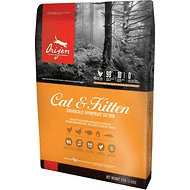
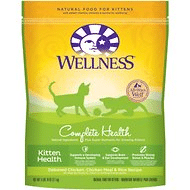
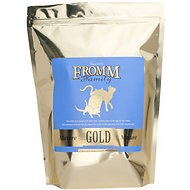
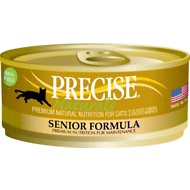
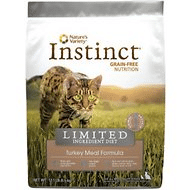
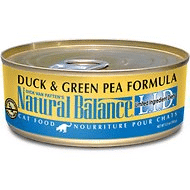










I feed my Bengals with Acana.